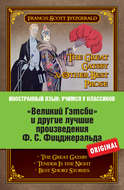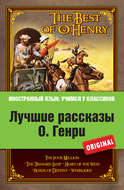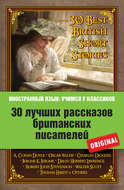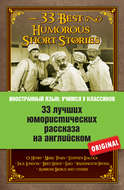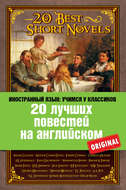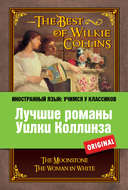Kitabı oku: «75 лучших рассказов / 75 Best Short Stories»
My Adventure in Norfolk (A.J. Alan)
I don’t know how it is with you, but during Februarymy wife generally says to me: ‘Have you thought at all about what we are going to do for August?’ And, of course, I say, ‘No,’ and then she begins looking through the advertisements of bungalows1 to let.
Well, this happened last year, as usual, and she eventually produced one that looked possible. It said: ‘Norfolk2 – Hickling Broad – Furnished Bungalow – Garden – Garage, Boathouse,’ and all the rest of it – Oh – and plate and linen. It also mentioned an exorbitant rent. I pointed out the bit about the rent, but my wife said: ‘Yes, you’ll have to go down and see the landlord, and get him to come down. They always do.’ As a matter of fact, they always don’t, but that’s a detail.
Anyway, I wrote off to the landlord and asked if he could arrange for me to stay the night in the place to see what it was really like. He wrote back and said: ‘Certainly,’ and that he was engaging Mrs. So-and-So to come in and ‘oblige me,’ and make up the beds and so forth.
I tell you, we do things thoroughly – in our family – I have to sleep in all the beds, and when I come home my wife counts the bruises and decides whether they will do or not.
At any rate, I arrived, in a blinding snowstorm, at aboutthe most desolate spot on God’s earth. I’d come to Potter Heigham by train, and been driven on (it was a good five miles from the station). Fortunately, Mrs. Selston, the old lady who was going to ‘do’ for me, was there, and she’d lighted a fire, and cooked me a steak, for which I was truly thankful.
I somehow think the cow, or whatever they get steaks off, had only died that morning. It was very – er – obstinate. While I dined, she talked to me. Shewould tell me all about an operation her husband had just had. All about it. It was almost a lecture on surgery. The steak was rather underdone, and it sort of made me feel I was illustrating her lecture. Anyway, she put me clean off my dinner, and then departed for the night.
I explored the bungalow and just had a look outside. It was, of course, very dark, but not snowing quite so hard. The garage stood about fifteen yards from the back door. I walked round it, but didn’t go in. I also went down to the edge of the broad, and verified the boathouse. The whole place looked as though it might be all right in the summertime, but just then it made one wonder why people ever wanted to go to the North Pole.
Anyhow, I went indoors, and settled down by the fire. You’ve no idea how quiet it was; even the waterfowl had taken a night off – at least, they weren’t working.
At a few minutes to eleven I heard the first noise there’d been since Mrs. What’s-her-name – Selston – had cleared out. It was the sound of a car. If it had gone straight by I probably shouldn’t have noticed it at all, only it didn’t go straight by; it seemed to stop farther up the road, before it got to the house. Even that didn’t make much impression. After all, carsdo stop.
It must have been five or ten minutes before it was borne in on me that it hadn’t gone on again. So I got up and looked out of the window. It had left off snowing, and there was a glare through the gate that showed that there were headlamps somewhere just out of sight. I thought I might as well stroll out and investigate.
I found a fair-sized limousine pulled up in the middle of the road about twenty yards short of my gate. The light was rather blinding, but when I got close to it I found a girl with the bonnet open, tinkering with the engine. Quite an attractive young female, from what one could see, but she was so muffled up in furs that it was rather hard to tell.
I said:
‘Er – good evening – anything I can do.’
She said she didn’t know what was the matter. The engine had just stopped, and wouldn’t start again. And ithad! It wouldn’t even turn, either with the self-starter or the handle. The whole thing was awfully hot, and I asked her whether there was any water in the radiator. She didn’t see why there shouldn’t be, there always had been. This didn’t strike me as entirely conclusive. I said, we’d better put some in, and see what happened. She said, why not use snow? But I thought not. There was an idea at the back of my mind that there was some reason why it was unwise to use melted snow, and it wasn’t until I arrived back with a bucketful that I remembered what it was. Of course – goitre.
When I got back to her she’d got the radiator cap off, and inserted what a Danish friend of mine calls a ‘funeral.’ We poured a little water in…. Luckily I’d warned her to stand clear. The first tablespoonful that went in came straight out again, red hot, and blew the ‘funeral’ sky-high. We waited a few minutes until things had cooled down a bit, but it was no go. As fast as we poured water in it simply ran out again into the road underneath. It was quite evident that she’d been driving with the radiator bone dry and that her engine had seized right up.
I told her so. She said:
‘Does that mean I’ve got to stop here all night?’
I explained that it wasn’t as bad as all that; that is, if she cared to accept the hospitality of my poor roof (and itwas a poor roof – it let the wet in). But she wouldn’t hear of it. By the by, she didn’t know the – er – circumstances, so it wasn’t that. No, she wanted to leave the car where it was and go on on foot.
I said:
‘Don’t be silly, it’s miles to anywhere.’
However, at that moment we heard a car coming along the road, the same way as she’d come. We could see its lights, too, although it was a very long way off. You know how flat Norfolk is – you can see a terrific distance.
I said:
‘There’s the way out of all your troubles. This thing, whatever it is, will give you a tow to the nearest garage, or at any rate a lift to some hotel.’
One would have expected her to show some relief, but she didn’t. I began to wonder what she jolly welldid want. She wouldn’t let me help her to stop where she was, and she didn’t seem anxious for anyone to help her to go anywhere else.
She was quite peculiar about it. She gripped hold of my arm, and said:
‘What do you think this is that’s coming?’
I said:
‘I’m sure I don’t know, being a stranger in these parts, but it sounds like a lorry full of milk cans.’
I offered to lay her sixpence about it (this was before the betting-tax came in). She’d have had to pay, too, because itwas a lorry full of milk cans. The driver had to pull up because there wasn’t room to get by.
He got down and asked if there was anything he could do to help. We explained the situation. He said he was going to Norwich3, and was quite ready to give her a tow if she wanted it. However, she wouldn’t do that, and it was finally decided to shove her car into my garage for the night, to be sent for next day, and the lorry was to take her along to Norwich.
Well, I managed to find the key of the garage, and the lorry-driver – Williams, his name was – and I ran the car in and locked the door. This having been done – (ablative absolute) – I suggested that it was a very cold night. Williams agreed, and said he didn’t mind if he did. So I took them both indoors and mixed them a stiff whisky and water each. There wasn’t any soda. And, naturally, the whole thing had leftme very cold, too. I hadn’t an overcoat on.
Up to now I hadn’t seriously considered the young woman. For one thing it had been dark,and there had been a seized engine to look at. Er – I’m afraid that’s not a very gallant remark. What I mean is that to anyone with a mechanical mind a motor-car in that condition is much more interesting than – er – well, it is very interesting – but why labour the point? However, in the sitting-room, in the lamplight, it was possible to get more of an idea. She was a little older than I’d thought, and her eyes were too close together.
Of course, she wasn’t a – how shall I put it? Her manners weren’t quite easy and she was careful with her English.You know. But that wasn’t it. She treated us with a lack of friendliness which was – well, we’d done nothing to deserve it. There was a sort of vague hostility and suspicion, which seemed rather hard lines, considering. Also, she was so anxious to keep in the shadow that if I hadn’t moved the lamp away she’d never have got near the fire at all.
And the way she hurried the wretched Williams over his drink was quite distressing; and foolish, too, ashe was going to drive, but that was her – funnel. When he’d gone out to start up his engine I asked her if she was all right for money, and she apparently was. Then they started off, and I shut up the place and went upstairs.
There happened to be a local guide-book in my bedroom, with maps in it. I looked at these and couldn’t help wondering where the girl in the car had come from; I mean my road seemed so very unimportant. The sort of road one might use if one wanted to avoid people. If one were driving a stolen car, for instance. This was quite a thrilling idea. I thought it might be worth while having another look at the car. So I once more unhooked the key from the kitchen dresser and sallied forth into the snow. It was as black as pitch, and so still that my candle hardly flickered. It wasn’t a large garage, and the car nearly filled it. By the by, we’d backed it in so as to make it easier to tow it out again.
The engine I’d already seen, so I squeezed past along the wall and opened the door in the body part of the car. At least, I only turned the handle, and the door was pushed open from the inside and – something – fell out on me. It pushed me quite hard, and wedged me against the wall. It also knocked the candle out of my hand and left me in the dark – which was a bit of a nuisance. I wondered what on earth the thing was – barging into me like that – so I felt it, rather gingerly, and found it was a man – a dead man – with a moustache. He’d evidently been sitting propped up against the door. I managed to put him back, as decorously as possible, and shut the door again.
After a lot of grovelling about under the car I found the candle and lighted it, and opened the opposite door and switched on the little lamp in the roof – and then – oo-er!
Of course, I had to make some sort of examination. He was an extremely tall and thin individual. He must have been well over six feet three. He was dark and very cadaverous-looking. In fact, I don’t suppose he’d ever looked so cadaverous in his life. He was wearing a trench coat.
It wasn’t difficult to tell what he’d died of. He’d been shot through the back. I found the hole just under the right scrofula, or scalpel – what is shoulder-blade, anyway? Oh, clavicle – stupid of me – well, that’s where it was, and the bullet had evidently gone through into the lung. I say ‘evidently,’ and leave it at that.
There were no papers in his pockets, and no tailor’s name on his clothes, but there was a note-case, with nine pounds in it. Altogether a most unpleasant business. Of course, it doesn’t do to question the workings of Providence, but one couldn’t help wishing it hadn’t happened. It was just a little mysterious, too – er – who had killed him. It wasn’t likely that the girl had or she wouldn’t have been joy-riding about the country with him; and if someone else had murdered him why hadn’t she mentioned it? Anyway, she hadn’t and she’d gone, so one couldn’t do anything for the time being. No telephone, of course. I just locked up the garage and went to bed. That was two o’clock.
Next morning I woke early, for some reason or other, and it occurred to me as a good idea to go and have a look at things – by daylight, and before Mrs. Selston turned up. So I did. The first thing that struck me was that it had snowed heavily during the night, because there were no wheel tracks or footprints, and the second was that I’d left the key in the garage door. I opened it and went in. The place was completely empty. No car, no body, no nothing. There was a patch of grease on the floor where I’d dropped the candle, otherwise there was nothing to show I’d been there before. One of two things must have happened: either some people had come along during the night and taken the car away, or else I’d fallen asleep in front of the fire and dreamt the whole thing.
Then I remembered the whisky glasses.
They should still be in the sitting-room. I went back to look, and they were, all three of them. So ithadn’t been a dream and the car had been fetched away, but they must have been jolly quiet over it.
The girl had left her glass on the mantel-piece, and it showed several very clearly defined finger-marks. Some were mine, naturally, because I’d fetched the glass from the kitchen and poured out the drink for her, but hers, her finger-marks, were clean, and mine were oily, so it was quite easy to tell them apart. It isn’t necessary to point out that this glass was very important. There’d evidently been a murder, or something of that kind, and the girl must have known all about it, even if she hadn’t actually done it herself, so anything she had left in the way of evidence ought to be handed over to the police; and this was all shehad left. So I packed it up with meticulous care in an old biscuit-box out of the larder.
When Mrs. Selston came I settled up with her and came back to Town. Oh, I called on the landlord on the way and told him I’d ‘let him know’ about the bungalow. Then I caught my train, and in due course drove straight to Scotland Yard. I went up and saw my friend there. I produced the glass and asked him if his people could identify the marks. He said: ‘Probably not,’ but he sent it down to the fingerprint department and asked me where it came from. I said: ‘Never you mind; let’s have the identification first.’ He said: ‘All right.’
They’re awfully quick, these people – the clerk was back in three minutes with a file of papers. They knew the girl all right. They told me her name and showed me her photograph; not flattering. Quite an adventurous lady, from all accounts. In the early part of her career she’d done time twice for shop-lifting, chiefly in the book department. Then she’d what they call ‘taken up with’ a member of one of those race-gangs one sometimes hears about.
My pal went on to say that there’d been a fight between two of these gangs, in the course of which her friend had got shot. She’d managed to get him away in a car, but it had broken down somewhere in Norfolk. So she’d left it and the dead man in someone’s garage, and had started off for Norwich in a lorry. Only she never got there. On the way the lorry had skidded, and both she and the driver – a fellow called Williams – had been thrown out, and they’d rammed their heads against a brick wall, which everyone knows is a fatal thing to do. At least, it was in their case.
I said: ‘Look here, it’s all very well, but you simply can’t know all this; there hasn’t been time – it only happened last night.’
He said: ‘Last night be blowed! It all happened in February, nineteen nineteen. The people you’ve described have been dead for years.’
I said: ‘Oh!’
And to think that I might have stuck to that nine pounds!
Marjorie’s Three Gifts (Louisa May Alcott)
Marjorie sat on the door-step, shelling peas, quite unconscious what a pretty picture she made, with the roses peeping at her through the lattice work of the porch, the wind playing hide-and-seek in her curly hair, while the sunshine with its silent magic changed her faded gingham to a golden gown, and shimmered on the bright tin pan as if it were a silver shield. Old Rover lay at her feet, the white kitten purred on her shoulder, and friendly robins hopped about her in the grass, chirping ‘A happy birthday, Marjorie!’
But the little maid neither saw nor heard, for her eyes were fixed on the green pods, and her thoughts were far away. She was recalling the fairy-tale granny told her last night, and wishing with all her heart that such things happened nowadays. For in this story, as a poor girl like herself sat spinning before the door, a Brownie4 came by, and gave the child a good-luck penny; then a fairy passed, and left a talisman5 which would keep her always happy; and last of all, the prince rolled up in his chariot6, and took her away to reign with him over a lovely kingdom, as a reward for her many kindnesses to others.
When Marjorie imagined this part of the story, it was impossible to help giving one little sigh, and for a minute she forgot her work, so busy was she thinking what beautiful presents she would give to all the poor children in her realm when THEY had birthdays. Five impatient young peas took this opportunity to escape from the half-open pod in her hand and skip down the steps, to be immediately gobbled up by an audacious robin, who gave thanks in such a shrill chirp that Marjorie woke up, laughed, and fell to work again. She was just finishing, when a voice called out from the lane, —
‘Hi, there! come here a minute, child!’ and looking up, she saw a little old man in a queer little carriage drawn by a fat little pony.
Running down to the gate, Marjorie dropped a curtsy, saying pleasantly, —
‘What did you wish, sir?’
‘Just undo that check-rein for me. I am lame, and Jack wants to drink at your brook,’ answered the old man, nodding at her till his spectacles danced on his nose.
Marjorie was rather afraid of the fat pony who tossed his head, whisked his tail, and stamped his feet as if he was of a peppery temper. But she liked to be useful, and just then felt as if there were few things she could NOT do if she tried, because it was her birthday. So she proudly let down the rein, and when Jack went splashing into the brook, she stood on the bridge, waiting to check him up again after he had drunk his fill of the clear, cool water.
The old gentleman sat in his place, looking up at the little girl, who was smiling to herself as she watched the blue dragon-flies dance among the ferns, a blackbird tilt on the alder boughs, and listened to the babble of the brook.
‘How old are you, child?’ asked the old man, as if he rather envied this rosy creature her youth and health.
‘Twelve to-day, sir;’ and Marjorie stood up straight and tall, as if mindful of her years.
‘Had any presents?’ asked the old man, peering up with an odd smile.
‘One, sir, – here it is;’ and she pulled out of her pocket a tin savings-bank in the shape of a desirable family mansion, painted red, with a green door and black chimney. Proudly displaying it on the rude railing of the bridge, she added, with a happy face, —
‘Granny gave it to me, and all the money in it is going to be mine.’
‘How much have you got?’ asked the old gentleman, who appeared to like to sit there in the middle of the brook, while Jack bathed his feet and leisurely gurgled and sneezed.
‘Not a penny yet, but I’m going to earn some,’ answered Marjorie, patting the little bank with an air of resolution pretty to see.
‘How will you do it?’ continued the inquisitive old man.
‘Oh, I’m going to pick berries and dig dandelions, and weed, and drive cows, and do chores. It is vacation, and I can work all the time, and earn ever so much.’
‘But vacation is play-time, – how about that?’
‘Why, that sort of work IS play, and I get bits of fun all along. I always have a good swing when I go for the cows, and pick flowers with the dandelions. Weeding isn’t so nice, but berrying is very pleasant, and we have good times all together.’
‘What shall you do with your money when you get it?’
‘Oh, lots of things! Buy books and clothes for school, and, if I get a great deal, give some to granny. I’d love to do that, for she takes care of me, and I’d be so proud to help her!’
‘Good little lass!’ said the old gentleman, as he put his hand in his pocket. ‘Would you now?’ he added, apparently addressing himself to a large frog who sat upon a stone, looking so wise and grandfatherly that it really did seem quite proper to consult him. At all events, he gave his opinion in the most decided manner, for, with a loud croak, he turned an undignified somersault into the brook, splashing up the water at a great rate. ‘Well, perhaps it wouldn’t be best on the whole. Industry is a good teacher, and money cannot buy happiness, as I know to my sorrow.’
The old gentleman still seemed to be talking to the frog, and as he spoke he took his hand out of his pocket with less in it than he had at first intended.
‘What a very queer person!’ thought Marjorie, for she had not heard a word, and wondered what he was thinking about down there.
Jack walked out of the brook just then, and she ran to check him up; not an easy task for little hands, as he preferred to nibble the grass on the bank. But she did it cleverly, smoothed the ruffled mane, and, dropping another curtsy, stood aside to let the little carriage pass.
‘Thank you, child – thank you. Here is something for your bank, and good luck to it.’
As he spoke, the old man laid a bright gold dollar in her hand, patted the rosy cheek, and vanished in a cloud of dust, leaving Marjorie so astonished at the grandeur of the gift, that she stood looking at it as if it had been a fortune. It was to her; and visions of pink calico7 gowns, new grammars, and fresh hat-ribbons danced through her head in delightful confusion, as her eyes rested on the shining coin in her palm.
Then, with a solemn air, she invested her first money by popping it down the chimney of the scarlet mansion, and peeping in with one eye to see if it landed safely on the ground-floor. This done, she took a long breath, and looked over the railing to be sure it was not all a dream. No; the wheel marks were still there, the brown water was not yet clear, and, if a witness was needed, there sat the big frog again, looking so like the old gentleman, with his bottle-green coat, speckled trousers, and twinkling eyes, that Marjorie burst out laughing, and clapped her hands, saying aloud, –
‘I’ll play he was the Brownie, and this is the good-luck penny he gave me. Oh, what fun!’ and away she skipped, rattling the dear new bank like a castanet8.
When she had told granny all about it, she got knife and basket, and went out to dig dandelions; for the desire to increase her fortune was so strong, she could not rest a minute. Up and down she went, so busily peering and digging, that she never lifted up her eyes till something like a great white bird skimmed by so low she could not help seeing it. A pleasant laugh sounded behind her as she started up, and, looking round, she nearly sat down again in sheer surprise, for there close by was a slender little lady, comfortably established under a big umbrella.
‘If therewere any fairies, I’d be sure that was one,’ thought Marjorie, staring with all her might, for her mind was still full of the old story; and curious things do happen on birthdays, as every one knows.
It really did seem rather elfish9 to look up suddenly and see a lovely lady all in white, with shining hair and a wand in her hand, sitting under what looked very like a large yellow mushroom in the middle of a meadow, where, till now, nothing but cows and grasshoppers had been seen. Before Marjorie could decide the question, the pleasant laugh came again, and the stranger said, pointing to the white thing that was still fluttering over the grass like a little cloud, —
‘Would you kindly catch my hat for me, before it blows quite away?’
Down went basket and knife, and away ran Marjorie, entirely satisfied now that there was no magic about the new-comer; for if she had been an elf, couldn’t she have got her hat without any help from a mortal child? Presently, however, it did begin to seem as if that hat was bewitched, for it led the nimble-footed Marjorie such a chase that the cows stopped feeding to look on in placid wonder; the grasshoppers vainly tried to keep up, and every ox-eye daisy did its best to catch the runaway, but failed entirely, for the wind liked a game of romps, and had it that day. As she ran, Marjorie heard the lady singing, like the princess in the story of the Goose-Girl, —
‘Blow, breezes, blow!
Let Curdkin’s hat go!
Blow, breezes, blow!
Let him after it go!
O’er hills, dales and rocks,
Away be it whirled,
Till the silvery locks
Are all combed and curled.’
This made her laugh so that she tumbled into a clover-bed, and lay there a minute to get her breath. Just then, as if the playful wind repented of its frolic, the long veil fastened to the hat caught in a blackberry-vine nearby, and held the truant fast till Marjorie secured it.
‘Now come and see what I am doing,’ said the lady, when she had thanked the child.
Marjorie drew near confidingly, and looked down at the wide-spread book before her. She gave a start, and laughed out with surprise and delight; for there was a lovely picture of her own little home, and her own little self on the door-step, all so delicate, and beautiful, and true, it seemed as if done by magic.
‘Oh, how pretty! There is Rover, and Kitty and the robins, and me! How could you ever do it, ma’am?’ said Marjorie, with a wondering glance at the long paint-brush, which had wrought what seemed a miracle to her childish eyes.
‘I’ll show you presently; but tell me, first, if it looks quite right and natural to you. Children sometimes spy out faults that no one else can see,’ answered the lady, evidently pleased with the artless praise her work received.
‘It looks just like our house, only more beautiful. Perhaps that is because I know how shabby it really is. That moss looks lovely on the shingles, but the roof leaks. The porch is broken, only the roses hide the place; and my gown is all faded, though it once was as bright as you have made it. I wish the house and everything would stay pretty forever, as they will in the picture.’
While Marjorie spoke, the lady had been adding more color to the sketch, and when she looked up, something warmer and brighter than sunshine shone in her face, as she said, so cheerily, it was like a bird’s song to hear her, —
‘It can’t be summer always, dear, but we can make fair weather for ourselves if we try. The moss, the roses, and soft shadows show the little house and the little girl at their best, and that is what we all should do; for it is amazing how lovely common things become, if one only knows how to look at them.’
‘I wishI did,’ said Marjorie, half to herself, remembering how often she was discontented, and how hard it was to get on, sometimes.
‘So do I,’ said the lady, in her happy voice. ‘Just believe that there is a sunny side to everything, and try to find it, and you will be surprised to see how bright the world will seem, and how cheerful you will be able to keep your little self.’
‘I guess granny has found that out, for she never frets. I do, but I’m going to stop it, because I’m twelve today, and that is too old for such things,’ said Marjorie, recollecting the good resolutions she had made that morning when she woke.
‘I am twice twelve, and not entirely cured yet; but I try, and don’t mean to wear blue spectacles if I can help it,’ answered the lady, laughing so blithely that Marjorie was sure she would not have to try much longer. ‘Birthdays were made for presents, and I should like to give you one. Would it please you to have this little picture?’ she added, lifting it out of the book.
‘Truly my own? Oh, yes, indeed!’ cried Marjorie, coloring with pleasure, for she had never owned so beautiful a thing before.
‘Then you shall have it, dear. Hang it where you can see it often, and when you look, remember that it is the sunny side of home, and help to keep it so.’
Marjorie had nothing but a kiss to offer by way of thanks, as the lovely sketch was put into her hand; but the giver seemed quite satisfied, for it was a very grateful little kiss. Then the child took up her basket and went away, not dancing and singing now, but slowly and silently; for this gift made her thoughtful as well as glad. As she climbed the wall, she looked back to nod good-by to the pretty lady; but the meadow was empty, and all she saw was the grass blowing in the wind.
‘Now, deary, run out and play, for birthdays come but once a year, and we must make them as merry as we can,’ said granny, as she settled herself for her afternoon nap, when the Saturday cleaning was all done, and the little house as neat as wax.
So Marjorie put on a white apron in honor of the occasion, and, taking Kitty in her arms, went out to enjoy herself. Three swings on the gate seemed to be a good way of beginning the festivities; but she only got two, for when the gate creaked back the second time, it stayed shut, and Marjorie hung over the pickets, arrested by the sound of music.
‘It’s soldiers,’ she said, as the fife and drum drew nearer, and flags were seen waving over the barberry-bushes at the corner.
‘No; it’s a picnic,’ she added in a moment; for she saw hats with wreaths about them bobbing up and down, as a gaily-trimmed hay-cart full of children came rumbling down the lane.
‘What a nice time they are going to have!’ thought Marjorie, sadly contrasting that merry-making with the quiet party she was having all by herself.
Suddenly her face shone, and Kitty was waved over her head like a banner, as she flew out of the gate, crying, rapturously, —
‘It’s Billy! and I know he’s come for me!’
It certainly WAS Billy, proudly driving the old horse, and beaming at his little friend from the bower of flags and chestnut-boughs, where he sat in state, with a crown of daisies on his sailor-hat and a spray of blooming sweetbrier in his hand. Waving his rustic sceptre, he led off the shout of ‘Happy birthday, Marjorie!’ which was set up as the wagon stopped at the gate, and the green boughs suddenly blossomed with familiar faces, all smiling on the little damsel, who stood in the lane quite overpowered with delight.
‘It’s a s’prise10 party!’ cried one small lad, tumbling out behind.
‘We are going up the mountain to have fun!’ added a chorus of voices, as a dozen hands beckoned wildly.

